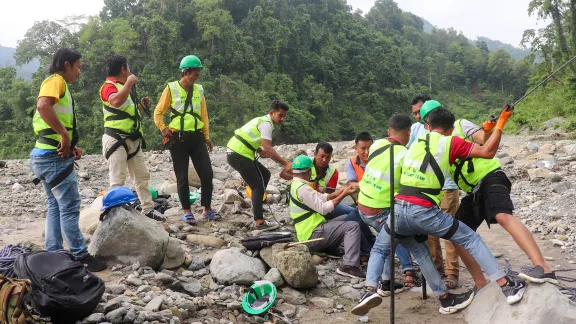
Members of the Adompur Indigenous Women Laborers’ Cooperative, whose small weekly savings have generated capital that provides credit, and health and education loans. Photo: BNELC
Diaconal workshop fosters collaboration and learning among Asian churches
(LWI) – Junus Ricardo Purba from the Indonesian Christian Lutheran Church (Gereja Kristen Lutheran Indonesia – GKLI), says his participation in a recent regional workshop for diaconal actors provides inspiration for youth to “organize our own thematic workshops on topics like mental health awareness and financial literacy, which directly serve the needs identified in our community assessment.”
The GKLI youth leader was among 50 participants from 21 Lutheran churches in Bangladesh, Cambodia, India, Indonesia, Malaysia, Myanmar, Nepal and Thailand who attended the 22-24 October 2024 online workshop under the theme, “Empowering communities through diakonia: Faith, action, and collaboration.” The Lutheran World Federation (LWF) brought together the coordinators of LWF-supported projects and scholarship holders to share good practices and discuss how churches’ diaconal work aligns with LWF’s strategic priorities on gender justice, working with indigenous people and addressing people with disabilities.
Mr Shamson Soren from the Bangladesh Northern Evangelical Lutheran Church (BNELC) highlighted the Adompur Indigenous Women Laborers’ Cooperative, which empowers 62 members through savings, credit, and health and education loans. This initiative fosters economic independence and improves housing, healthcare, and leadership roles for women, focusing on the marginalized Santal community. “It’s incredible that very little savings have generated a big capital for the women in the church,” he said. They each contribute 10 Bangladeshi Taka, less than one Euro, per week, which has grown into a capital of Taka 458,054 (EUR 540), he added.
Indonesia’s United Protestant Church (Gereja Protestan Persekutuan -GPP) leads the Hospitality Church for People with Disabilities project, focusing on inclusivity. Rev. Lukman Pasaribu explained how a nearly complete training center will support people with disabilities by offering skills-building programs, and income-generation from production of Holy Communion wine and handicrafts. GPP’s initiative also promotes accessibility by training pastors in sign language, exemplifying faith-driven inclusivity.

In Nepal’s Jhapa and Morang districts the Lutheran Community Welfare Society trains locals in disaster response preparedness, and enhancing resilience through food security. Photo: LCWS
The core aim of hope coupled with its values, are guiding principles for the diakonia work of our church
Dr Milton Sastry, Andhra Evangelical Lutheran Church in India.
Meanwhile, the Lutheran Community Welfare Society (LCWS) of the Nepal Evangelical Lutheran Church trains local communities in disaster preparedness. Coordinator Mr Suman Rai reported that 710 individuals from 142 households have benefited from grain banks and disaster response training, enhancing resilience in Jhapa and Morang districts.
Hope and shared values
Discussing the new LWF Strategy 2025-2031, participants underlined the theme of hope, and incorporating LWF’s values and priorities in planning church projects.
“The core aim of hope coupled with its values are guiding principles for the diakonia work of our church,” said Dr Milton Sastry, Andhra Evangelical Lutheran Church in India.
“The experience-sharing sessions have been insightful. We have learned how to support vulnerable women who are abused and neglected, as well as young girls facing unplanned pregnancies and neglect from their families and society,” noted Ms Daphne Annamal Abraham, Evangelical Lutheran Church in Malaysia.
Theology of compassion and transformation
Rev. Katariina Kiilunen, LWF Program Executive for Capacity Building and Leadership Development led a session on biblical dimensions of diakonia, which brought out valuable insights on the theology of inclusion, liberation, compassion, repentance, redemption and restoration. “Jesus operated in an era where he moved criticism to compassion: he broke the norms and we are called to do the same,” reported one group following discussions on Jesus’ encounter with Zacchaeus and healing the crippled woman (Luke 13: 10-13; 19:1-10).
Many of the participants emphasized that scarcity of resources should not be viewed as a constraint in diaconal work. “Diakonia is to realize that we have everything, that everyone has something to give. We cannot wait until we are rich. Jesus calls us to action, and we must act when we see people in need, we cannot just send them away,” another group noted.
“‘To be seen’ could be a slogan, reminding diaconal actors to see the people in our context—the oppressed, marginalized and suffering. It leads to change that restores, reforms and transforms,” remarked Kiilunen, who co-facilitated the workshop with Ms Rebekka Meissner, Program Executive for Member Church Projects and Mr Ashenafi Haile, Program Executive for Diakonia and Development.


